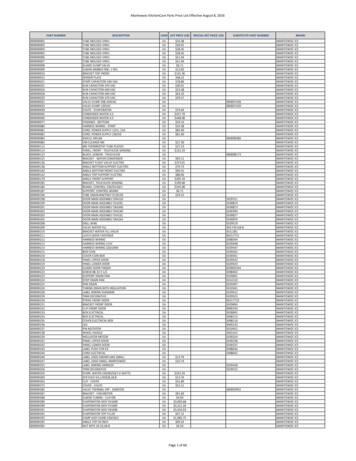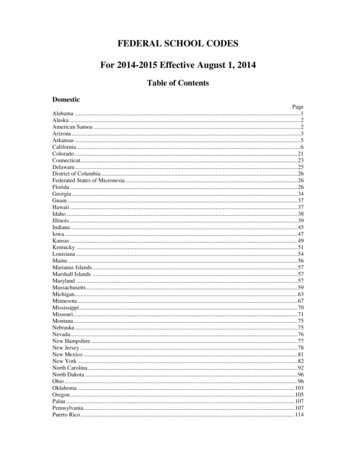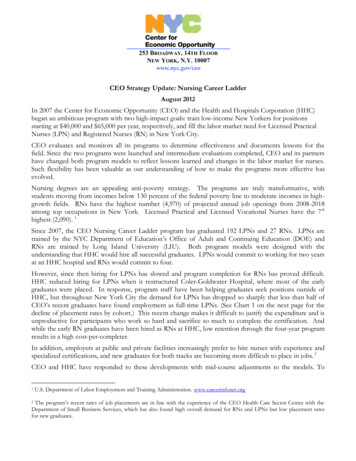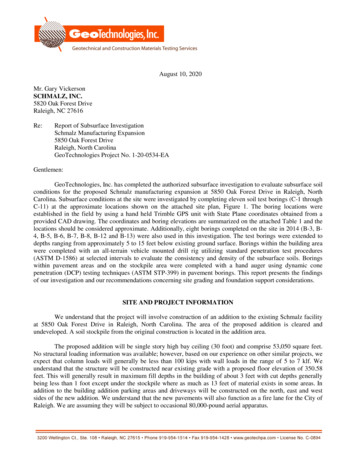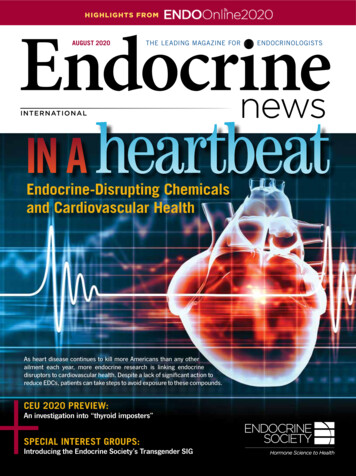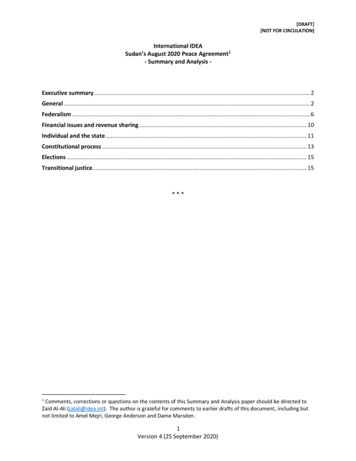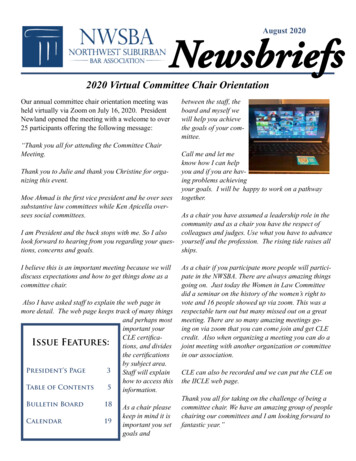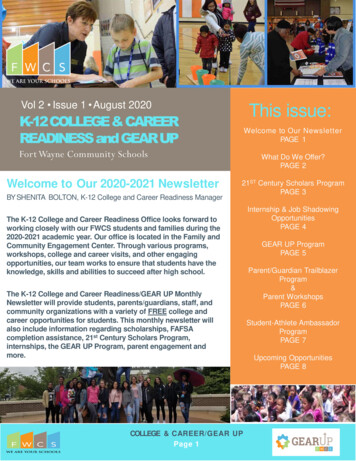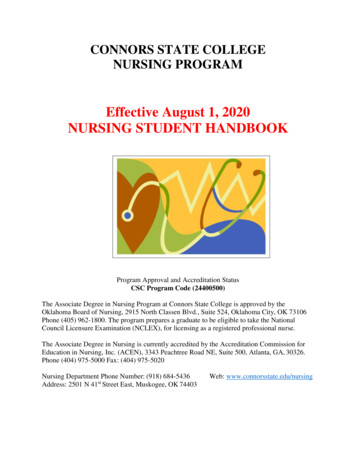
Transcription
CONNORS STATE COLLEGENURSING PROGRAMEffective August 1, 2020NURSING STUDENT HANDBOOKProgram Approval and Accreditation StatusCSC Program Code (24400500)The Associate Degree in Nursing Program at Connors State College is approved by theOklahoma Board of Nursing, 2915 North Classen Blvd., Suite 524, Oklahoma City, OK 73106Phone (405) 962-1800. The program prepares a graduate to be eligible to take the NationalCouncil Licensure Examination (NCLEX), for licensing as a registered professional nurse.The Associate Degree in Nursing is currently accredited by the Accreditation Commission forEducation in Nursing, Inc. (ACEN), 3343 Peachtree Road NE, Suite 500, Atlanta, GA, 30326.Phone (404) 975-5000 Fax: (404) 975-5020Nursing Department Phone Number: (918) 684-5436Address: 2501 N 41st Street East, Muskogee, OK 74403Web: www.connorsstate.edu/nursing
Welcome from the Nursing Faculty and StaffDear Nursing Student,The faculty and staff want to welcome you to our nursing program.Connors State College’s Nursing Program is a great place for you to prepare for a careeras an Associate Degree Nurse. Believing that each student is unique, the nursing faculty strive toassist each student to achieve their individual potential. Office hours are posted and appointmentscan be made by calling (918) 684-5436. An open-door policy is maintained for immediateconcerns.The program is based on End of Program Student Learning Outcomes (EPSLO’s) that arecarried throughout the program. These will assist you in knowing what is required for successfulcompletion of the program. Nursing is dynamic and based on physical, psycho-emotional, social,spiritual, and cultural concepts. This framework is supported by the application of scientifictheory, the mastery of technical and behavioral skills; and, a sensitive approach to care givingwhich requires a commitment to human welfare. You will use this knowledge to assist man inadapting to and understanding wellness and illness. Caring and experienced faculty are availableto assist you in gaining this knowledge.We look forward to interacting with you during your time in the nursing program. We willshare in your happiness as you are awarded your Associate of Applied Science Nursing degree andyour nursing pin, and we hope that you will remember Connors State College as the starting pointof your professional nursing care.With warm wishes,The Associate of Applied Science Nursing Faculty and Staff2
TABLE OF CONTENTSDISCLAIMER STATEMENTMISSIONPHILOSOPHYPROGRAM OUTCOMESEND OF PROGRAM STUDENT LEARNING OUTCOMES67799EDUCATIONAL PARTNERSHIPLEARNER RESPONSIBILITYFACULTY RESPONSIBILITY101010COURSE OVERVIEWS AND LEARNING EXPERIENCESNURS 1117 FOUNDATIONS IN NURSINGNURS 1132 MATHEMATICS FOR NURSESNURS 1228 ADAPTATIONS OF THE FAMILYNURS 1223 CLINICAL PRACTICUMNURS 2223 TRANSITIONS TO PROFESSIONAL NURSINGNURS 2137 MALADAPTIVE STATES INURS 2133 CLINICAL PRACTICUM INURS 2247 MALADAPTIVE STATES IINURS 2243 CLINICAL PRACTICUM IINURS 2252 TRENDS AND ISSUES IN NURSING1111111111121212121212ASSOCIATE OF APPLIED SCIENCE IN NURSING CURRICULUM13CONNORS STATE COLLEGE’S NURSING PROGRAM CONSIDERATIONS14PHYSICAL AND MENTAL REQUIREMENTS FOR PARTICIPATIONIN THE DEPARTMENT OF NURSING15ESSENTIAL JOB FUNCTIONS FOR CLINICAL ROTATIONS16PROGRESSIONGRADING SCALECONCURRENT THEORY AND CLINICAL COURSESSTARS (Subject Test Assessment Resource Service) Kaplan NursingKAPLAN TEST REFLECTION WORKSHEETRE-ENTRY POLICY171717181921STUDENT CODE OF CONDUCTDISCIPLINARY ACTIONS/STUDENT COUNSELING/PROBATIONDISMISSALACADEMIC DISHONESTYUNPROFESSIONAL CONDUCTAMERICAN NURSES ASSOCIATION (ANA)2626262627283
Six (6) Tips for Nurses Using Social MediaANA’s Principles for Social NetworkingSix (6) Tips to Avoid Problems282829NURSING PROGRAM POLICIES AND GUIDELINESATTENDANCE AND CLASSROOM LEARNINGHEALTH POLICIESCOLLABORATIVE GROUP WORKINCLEMENT WEATHERCELL PHONESCHILDREN IN CLASSACADEMIC ADVISEMENTCOURSE SYLLABIE-B OOKSLIBRARY FACILITIESCOMPUTER LABSTUDENT WITH DISABILITIESNON-DISCRIMINATION POLICYCOMPLAINT/GRIEVANCE PROCEDURESTUDENT DEVELOPMENTDRUG POLICYCHEMICAL (DRUG) OR PHYSICAL ING POLICIESABSENCESEXAM POLICIES AND PROCEDURESCHEATINGGRADE APPEAL PROCEDURE3737373838CLINICAL POLICIESDRESS CODEATTENDANCECLINICAL TARDINESSPREPARATIONGRADINGCLINICAL ASSIGNMENTSDUE DATE POLICYCLINICAL EVALUATION TOOLCARE PLANSUNSATISFACTORY PERFORMANCEACCOUNTABILITY IN CINICAL AREASSKILLS LABORATORY POLICIESCLINICAL RECORDSLIABILITY INSURANCEOCCUPATIONAL SAFETY AND HEALTH ADMINISTRATION (OSHA)HIPAA COMPLIANCE39394040414141414142424243434545454
GENERAL INFORMATIONCOMMUNICATIONSTUDENT EMPLOYMENTSTUDENT NURSES ASSOCIATIONSTUDENT CLASS OFFICERSSTUDENT COMMITTEE REPRESENTATIONCOMMUNITY PROJECT GUIDELINESSTUDENT LIFECNA CERTIFICATION EXAMINATIONPINNING CEREMONYFEES AND EXPENSESFINANCIAL AID454546464646475050505151DEPARTMENT INFORMATIONADDITIONAL INFORMATION5252APPENDICESAPPENDIX A: EXPOSURE CONTROL PLANMETHODS OF COMPLIANCEPOST EXPOSURE EVALUATION PROTOCOLAPPENDIX B: STUDENT COUNSELING PATHWAYAPPENDIX C: OKLAHOMA BOARD OF NURSING1. INSTRUCTIONS FOR PRACTICAL NURSING EQUIVALENCYCANDIDATES APPLYING FOR LICENSURE BYEXAMINATION.2. INFORMATION FOR APPLICANTS FOR LICENSUREOR AUA CERTIFICATION WITH HISTORY OF ARRESTS,CONVICTIONS, OR PRIOR DISCIPLINARY ACTIONS3. GUIDELINES FOR EMPLOYMENT OF INDIVIDUALSENROLLED IN OR NON-LICENSED GRADUATES OFNURSING EDUCATION PROGRAMAPPENDIX D: HANDBOOK SIGNATURE SHEET535353535455555555556
CONNORS STATE COLLEGENURSING PROGRAMDISCLAIMER STATEMENTThis Nursing Student Handbook contains important policies, procedures, and guidelinesthat all faculty and students are expected to follow. This handbook, along with the Connors StateCollege Student Handbook, is the primary source of policy information. Faculty and students areexpected to be familiar with the materials contained in these documents and to conduct themselvesaccordingly. Students should address any questions concerning this document to their faculty orto the Program Director.The Nursing Student Handbook is accurate at the time of printing but is subject to changefrom time to time as deemed appropriate by the nursing program in order to fulfill the role andmission or to accommodate circumstances beyond control. No materials, however complete, canpossibly anticipate every circumstance that a student or faculty member may encounter.Consequently, in implementing the policies, procedures and guidelines set forth in this handbook,the faculty, will at times be required to exercise appropriate professional judgment in managingsituations as they arise. Students, by following the Chain of Command, should address anyquestions or concerns through the Chain of Command process as follows: Faculty, ProgramDirector, and Vice-President of Academic Affairs.The nursing program reserves the right to terminate programs or modify programrequirements, content, schedule, delivery methods, and the sequence of the program offerings fromsemester to semester for educational, financial and/or other reasons beyond the control of thecollege or nursing program.Policies and procedures specific to the Nursing Program are outlined in the Nursing StudentHandbook. Students are also responsible for knowing information contained in their syllabiregarding course specific policies and procedures. Changes and updated communication isprovided to students via the learning management system, Blackboard and/or through their CSCe-mail.6
CONNORS STATE COLLEGENURSING PROGRAMMISSIONThe mission of the Connors State College Nursing Program is to promote excellence inassociate degree nursing education by providing quality learning, with service and leadershipexperiences designed to prepare a diverse student body for registered nurse licensure that willenable them to succeed in a global society.PHILOSOPHYThe faculty of the Department of Nursing function as an integral part of Connors StateCollege and in accord with the mission and core values of the college.The goal of the program of nursing is to provide residents of this community quality careereducation for licensure as registered nurses which will enable students to succeed in a globalsociety.The faculty believes MAN has physical, psycho-emotional, social, spiritual, and culturalneeds that fluctuate throughout the life span. Man, although unique, has similar basic needs thatfollow a sequential and predictable developmental pattern. In an attempt to meet the specific needsnecessary for growth and development, the individual continuously interacts with a dynamicenvironment and requires constant adaptation to achieve optimal health. Nurses recognize theindividual’s influential factors that affect health and provide care within the context of family,significant others, community, and the society.The faculty believes that HEALTH is a dynamic state of physical, psycho-emotional,social, spiritual, and cultural well-being. Health is not a constant state but fluctuates on a wellnessillness continuum, based on the individual’s ability to maintain his/her optimal level of wellness.Man’s unique strengths and positive attributes afford the potential for adaptive responses tointernal and external stressors, thereby maintaining an optimal state of health. When the individualis functioning and adapting effectively, he/she may be considered well. When the individual’sability to adapt effectively becomes impaired, his/her position on the wellness-illness continuummoves toward illness, and the individual may need to enter the health care system for moreaggressive assistance. The desire for optimal health may motivate man to seek out the health caresystem to effect prevention of illness and promotion of wellness.The faculty believes NURSING is a practice discipline and provides a caring service to allage levels directed at prevention of health problems, maintenance of health, care of the sick,restoration to optimal health, and provision for a peaceful death. We believe that nursing is alsoan applied science which incorporates social and scientific principles from the liberal arts andsciences as a basis for providing care to the individual and family.7
Nursing, as a profession, seeks to assist individuals and groups to meet basic human needs.Nursing care is directed toward reducing or removing stressors and enhancing the adaptivepotential of the client. The need for nursing care is initiated by the client’s potential, or actual,maladaptation to stressors and the inability to meet his/her needs.Nursing care to promote the adaptive response of the client is based on the use of thenursing process. This process is supported by application of theory, critical decision making(critical thinking), mastery of psychomotor skills, and a caring approach that requires acommitment to human well-being. Professional nursing includes a system of values and ethicsthat is expressed through the American Nurses Association (ANA) Scope and Standards ofPractice, ANA Code of Ethics, and the Oklahoma Nurse Practice Act.NURSING EDUCATION consists of content that has been gleaned from the competenciesand skills required in the practice setting for the role of the ADN nurse. Nursing education is acomplex discipline, incorporating concepts from other disciplines to build a broad base from whichto practice. In response to this belief, nursing education is best suited in an institution of higherlearning.The faculty assumes responsibility for development and implementation of the curriculumand for measuring the program and educational outcomes of the curriculum. The role of the facultyis to facilitate learning by creating an environment that is conducive to learning. This isaccomplished by providing experiences that meet the individual learner needs, by allowingfreedom of expression, and by stimulating curiosity.The faculty believes LEARNING is a dynamic process which occurs within the learner. Itis the acquisition and synthesis of knowledge resulting in a behavioral change necessitating activeparticipation on the student’s part to enhance the process as a self-directed learner. The facultyutilizes adult learning principles to create learning experiences that build on the students’ previousknowledge base and progress from the simple to the complex. Multiple and innovative teachingmethods are used to augment learning and meet individual learning styles. The nursing student isan active participant in the learning experience and incorporates the values of personal andprofessional development as a lifelong learner. Evaluation is the process utilized to determine theextent of the learning. Faculty believe that ongoing evaluation must be a shared process betweenthe teacher and student to ensure clear understanding of the expectations related to the nursingrole.The faculty believes that the graduate of an Associate Degree Nursing Program must beable to practice within five roles as defined in the Oklahoma Board of Nursing’s EducationalOutcomes of Associate Degree Nursing Programs: Roles and Competencies by Educational Level.As a provider of client-centered care, the graduate of the Connors State College NursingProgram uses the nursing process as a basis for critical decision-making as a caregiver, advocate,and teacher to clients across the life span. The faculty believes it is essential that the graduate havecurrent knowledge in nursing concepts, skills, and communication techniques in order to makesound nursing decisions, to implement therapeutic nursing interventions, and to practicecompetently.As a member working within interdisciplinary teams, the graduate of the Connors StateCollege Nursing Program is committed to professional growth, continuous learning, and selfdevelopment. The faculty believes it is essential that the graduate understands ethical standardsand the legal framework for practice in order to collaborate effectively with the client, significantsupport person(s) and health care team to achieve positive outcomes.8
The graduate from Connors State College Nursing Program will utilize evidenced-basedpractice to identify new and existing knowledge for application of relevant research to improvehealthcare and advance the profession. The faculty believes it is essential that the graduate havecurrent knowledge in nursing concepts, skills, and communication that involves collecting,synthesizing, analyzing, and interpreting data to improve client care and client safety.The graduate will apply quality improvement principles to assure delivery of safe andcompetent client care. Safety outcomes use National Patient Safety Goals (NSPG) for client care,staff scheduling, and regulation for work flow. To assure quality care, the graduate participates inand utilizes research from quality improvement studies to improve client care.As a user of informatics, the graduate of Connors State College Nursing Program will useinformation technology for improvement of client care and client safety. The faculty believes it isessential that the graduate have current knowledge in nursing concepts, skills, and communicationto understand practices and teaches all aspects of client confidentiality pertaining to informatics.Additionally, the graduate of Connors State College Nursing program functions as amanager of care when facilitating and coordinating nursing care for client(s) and groups of clientsusing management principles. To be competent in the role as manager of care, the faculty believethe graduate must possess the knowledge, skills and communication techniques necessary to makedecisions regarding priorities of care, delegation, efficient use of time and resources, and when toseek assistance from more advanced practitioners.PROGRAM OUTCOMES1. NCLEX-RN pass rate will be at least 80% for all first time test-takers during the same 12month period.2. Within one year of graduation, 90% of respondents surveyed who sought employment areworking as registered nurses in a variety of health care settings.3. Seventy percent (70%) of students will complete the program within 200% of the statedprogram length beginning with enrollment in the first nursing course.END OF PROGRAM STUDENT LEARNING OUTCOMESThe graduate of Connors State College with an Associate Degree of Applied Science inNursing will demonstrate the following:1. Provide patient-centered care by performing evidenced based nursing interventions, includingteaching, that are appropriate for diverse patient populations across the life span withinhealthcare settings.9
2. Participate as a member within interdisciplinary teams to foster communication, respect, andshared decision making, using ethical standards and the legal framework for practice tocollaborate effectively with patients, significant support person(s), and healthcare teams toachieve positive outcomes.3. Utilize evidenced-based practice to plan, coordinate, implement, and evaluate nursing care toimprove patient care safety in the healthcare setting.4. Apply quality improvement principles and national patient safety resources to assure thedelivery of safe and competent patient care.5. Apply information technology to ethically manage data, communicate effectively, and improvepatient care and safety.6. Accept accountability for nursing practice as a manager of care and responsibility forprofessional growth.EDUCATIONAL PARTNERSHIPLEARNER RESPONSIBILITY Participate actively in the learning and evaluation processesIntegrate and apply previously learned knowledgeExamine underlying assumptionsCommunicate effectivelyUse technology to support outcomesImplement decisions derived from theory and researchApply evidence based practiceCollaborate as a member of a teamDemonstrate professional integrityFACULTY RESPONSIBILITY Facilitate and support student success in the pursuit of knowledgePursue excellence in nursing practice through evidence based teachingRecognize the varying backgrounds, skills, and learning styles of studentsFoster the development of nursing judgmentProvide an environment conducive to active learningDemonstrate and role model professional integrityParticipate regularly in scholarly activitiesProvide formative evaluation by giving regular feedback10
COURSE OVERVIEWS AND LEARNING EXPERIENCESThe nursing theoretical content requires students to relate information from requiredcourses to the process of interpreting client data and planning effective interventions. To developcritical thinking and the application of the nursing process, a variety of learning experiences andteaching strategies are utilized which includes patient simulations, case studies, and cooperativelearning. Since the application of nursing knowledge to nursing practice requires more than justlearning a specific skill or task, students are asked to demonstrate problems and action withappropriate rationale; address individual patient differences; review legal and ethicalconsiderations; and teach others how to perform the necessary skills. These behaviors requireutilization of critical thinking and application of the nursing process.Courses are designed to progress sequentially from the application of simple concepts tocomplex concepts. Each course sequence has learning objectives designed to assist students inmeeting the requirements of the Connors State College’s Associates of Applied Nursing Program.NURS 1117 Foundations in Nursing – HybridSkills Lab/Clinical/Communication Lab. This course introduces the student to the roles ofthe nurse as a provider of care, a manager of care, and a member within the discipline of nursing.As a provider of care the student learns to assist the geriatric patient to meet his/her needs whenhealth fluctuates on the wellness-illness continuum. An overview of the nursing process ispresented as a method for planning care for patients throughout the life span. Emphasis will beplaced on establishing nurse/patient relationships and therapeutic communications. Skillsassociated with the
Connors State College’s Nursing Program is a great place for you to prepare for a career as an Associate Degree Nurse. Believing that each student is unique, the nursing faculty strive to assist each student to achieve their individual potential. Office hours are posted and appointments



